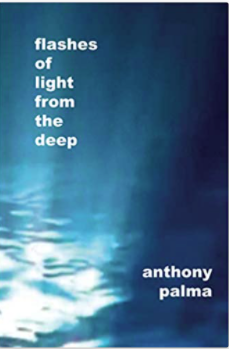Review of Anthony Palma’s flashes of light from the deep
February 24, 2021
“Poetry is ultimately mythology, the telling of stories of the soul.”
- Stanley Kunitz
From the moment language first revealed itself to human beings, we have been using it to tell stories. It was with a growing desire for those stories to evoke emotions that poetry began to take shape. From what is believed to be the oldest surviving piece of literature, The Epic of Gilgamesh, to the vast array of modern day writings, poetry can be found carved into stone and printed into millions of books - all in an attempt to connect with one another and better understand the world around us. If it is anything, poetry truly is the language of our souls. And with Anthony Palma’s flashes of light from the deep, you’ll find a poet who has mastered the art of telling stories of the soul.
Like all great storytellers, Palma has a natural ability to draw you in. I’ve watched him read his poetry at various venues around Pennsylvania for years now and in all that time I can hardly recall him ever reading one of his poems from a piece of paper or phone screen. Whenever he took the stage, he would remove the microphone from its stand, move the stand away from the center, and then turn back to lock eyes with his audience. We would then watch as he would imbue the stage with his confidence. He knew exactly how to tell the story he wanted you to hear. His language was clear. His cadence was concise. You gave attention to every word he spoke. There was no way you couldn’t.
Yet, whenever a poet is as talented at live performance as Palma is, there’s always a slight concern that their work could lose some of its potency once it’s put to page. Can their poetry sustain its impact when it's to be read and not heard? Thankfully, when it comes to flashes of light from the deep, the answer is YES. The poetry within retains all the power and depth found in the artist's verbal renditions because much like Palma himself, the book’s strengths lie in its confidence to tell its stories.
flashes of light from the deep is an engaging collection that devotes its 55 pages to the human experience. The people and places in these poems feel alive. Their words and emotions have meaning. Every detail builds upon one another to create a world that is both believable and fascinating. And at the center of this world is Palma himself. He wants to show you not only what he sees, but how he sees it. His many references to geography and culture allow him to ground the subjects of his poems. He then uses curiosity, wit, and empathy to guide the reader from one moment to the next without letting them get lost. Much like his performances, there are no wasted words. The poems are constructed beautifully and never stray from what they want to say. The collection begins with a single poem entitled “The Information Age” that sets the tone for what's to come with the striking line, “All that’s left of us are voices.” After that, the book splits into four separate, yet intertwined sections
In the first section, “Striking Shadows'', we find Palma painting pictures of people seeking definition and balance in their lives. In the poem “Revolution in the Family,” Palma describes a scene in which he and a group of older punk rockers sit around in a coffee shop wondering if their chance to revolt has passed them by. He recounts:
The speaker plays “Salad Days” and
I’ve never heard Minor Threat in Starbucks,
have you?
But on the night that Joe Strummer died we drank beers
and listened to “Straight to Hell” with the lights off.
These poetic portraits continue throughout this section. In “Rumble in the Bronx”, the Jackie Chan movie is used as a metaphor for wanting to fight back against gentrification. With “The City is Grey?”, Palma walks the city pondering why our relationships to each other seem to be seen in only black and white. Other stand-out poems from this section such as “The Economics of Delusion” and “The Bards I’ve Known” further delve into the anger and anxiety that come with our uncertainties.
The second section, “The Broken Land,” focuses more on the current socio-political landscape of our country as well as the loss of identity. “The Cracked Bell” is a biting political piece that illustrates how tourists want to see the crack in the Liberty Bell, yet they have no desire to look at the cracks in our society. The poet uses the poems “Other” and “Lament” to tell the stories of how two completely different people, his great-grandfather and his friend Khalid, struggled in their own unique way with being immigrants in America. In “A Fire Burns”, Palma himself struggles with the stereotypes of his own Italian heritage:
To you,
all we are is what you see elsewhere,
the goomba,
the guinea,
the guido,
the reject from the Jersey Shore,
wearing tailored suits as we
kiss rings and make deals
in back rooms.
Palma then goes on to describe how he will use the Tarantella, a traditional Italian dance that was once meant to rid oneself of poison, to cleanse himself of these judgements and “drive them out”. He continues:
Until then,
I will dance ‘til I’m empty,
and until my past is once again mine.
The third section of flashes of light from the deep is titled “Starfire Ground into Dust,” and it's here that the book begins to turn its gaze inward. The pieces in this section present nuanced reflections on life and death. In the poem “The Grave of Horace Pippen,” we find Palma visiting the grave of a long dead hometown artist as he ruminates what his life would be like if he was alive today. With “The Spider in the Closet,” the poet attempts to relate to the life of a spider that has died alone. “Sitting on a Beach as the End Draws Near” asks bold questions about faith and the afterlife. “The Fragile Illusion” examines how we can’t help but fight against the natural way of the world:
Once
we measured the world by
how often we died.
We watched the sun
become the moon
become the sun.
We questioned where it went,
and why it came back.
Then we shackled it, placed it
in a round cage,
and named it Time.
The final section, “Flashes of Light from the Deep,” not only supplies the book with its title, but it also bookends this collection with a sense of closure. Yet, as in real life, closure doesn’t always mean a happy ending. It's meant to be used as a stepping stone to move on, and that is exactly what the poems of this section aim to do. “Independence (Day)” might find Palma more reflective, yet he is no less diligent at examining the meaning of it all. In “Frog Songs,” the poet stands as one with his fellow human beings as we face the world together. The final two poems in flashes of light from the deep offer us two unique paths to what lies ahead. The nature imagery in “Immersion” elicits a sense of cleansing and rebirth that ends with a beautiful proclamation:
For a moment you are part of something
grander than you ever will be.
For once you are perfect.
And when we come to “Flying at Night”, Palma has us suspended in the air, flying into the unknown as we search for answers in the darkness:
Sooner or later,
we all are nothing but empty spaces,
the darkness that brightens future light.
In the end, I found flashes of light from the deep to be an earnest and engrossing story about identity. It explores who we are as people. It not only wants to know what makes us tick, it also wants to know what doesn’t. What begins as a charged observation of our lives, evolves into an introspective search for understanding. Palma’s keen eye for human behavior and a sense of humor allow him to create poetry that speaks directly to our souls. It’s easy to connect with Palma’s work because it's real. It looks you right in the eyes as it talks to you. It has no need to hide itself in the page; it sees no use in standing still. And once flashes of light from the deep gets your attention, it doesn’t let it go.
Philip Dykhouse lives in Philadelphia. His chapbook, Bury Me Here, was published and released by Toho Publishing in early 2020. His work has appeared in Toho Journal, Moonstone Press, everseradio.com, and Spiral Poetry. He was the featured reader for the Dead Bards of Philadelphia at the 2018 Philadelphia Poetry Festival.


